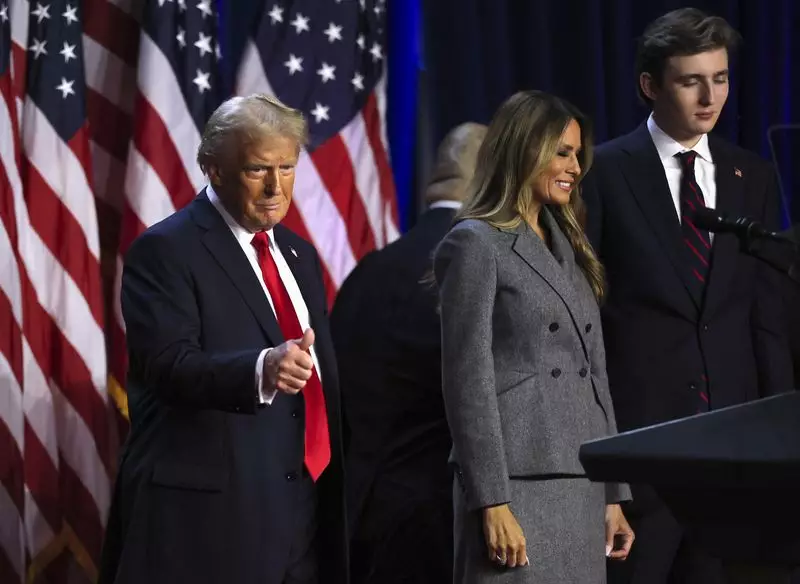The recent declaration of Donald Trump’s victory in the U.S. presidential election marks a pivotal moment in global politics, casting a long shadow over Sino-U.S. relations. As China braces for another four years of intense rivalry with the United States, the implications of this political landscape shift are profound, heralding a new era defined by trade conflicts, technological competition, and security dilemmas.
Trump’s ascent to power has been met with mixed feelings among Chinese officials and analysts. Unlike previous elections, Trump’s larger share of votes showcases a bolstering of his support base, suggesting a mandate to pursue his contentious policies more aggressively. This development raises alarm bells in Beijing, which has been anticipating complications in its relationship with the United States. According to Tong Zhao from the Carnegie Endowment for International Peace, while Trump’s victory is viewed with concern, it isn’t entirely unforeseen. Concerns loom over a possible deterioration in bilateral relations, thereby necessitating a recalibration of China’s diplomatic strategies.
The unpredictability associated with Trump’s foreign policy poses significant challenges. Da Wei, a key figure in international security studies, emphasizes that any preconceived notions of a structured plan from Beijing are illusory given Trump’s erratic policy shifts. This uncertainty complicates China’s approach, compelling it to remain agile in the face of evolving challenges.
A central feature of Trump’s re-election campaign was his aggressive stance toward China, especially concerning trade. His administration hinted at implementing tariffs surpassing 60% on Chinese imports and ending China’s most-favored-nation trading status, strategies that have sent shockwaves through Chinese leadership circles. Trade is a backbone of the Chinese economy, with exports to the U.S. exceeding $400 billion annually. Analysts are sounding alarms about the potential for an escalated trade war under Trump’s administration, especially as China grapples with internal economic pressures stemming from slowing growth and rising unemployment.
Zhao notes that an anticipated revival of the trade war could exacerbate existing issues within China’s economy, while also spurring a push for self-reliance in technological and manufacturing capacities. This drive toward economic independence highlights a crucial pivot: as the U.S. may restrict access to its markets and supply chains, China will likely intensify its efforts to bolster domestic innovation and technological capabilities.
As the Trump administration fosters a more transactional and isolationist U.S. foreign policy, Beijing is poised to capitalize on potential power vacuums. According to Brian Wong from the University of Hong Kong, China is likely to strengthen its diplomatic and economic ties with nations in the Global South, Europe, and Northeast Asia as it positions itself as a viable global leader.
Recent diplomatic engagements between China and India, as well as overtures toward Japan, suggest a strategic pivot aimed at filling the gaps left by U.S. disengagement. The dynamic is quite telling; with Trump focusing inward, China’s leadership is inclined to project strength on a global stage, seeking partnerships that can counterbalance U.S. influence. Zhao insists that Trump’s departure from multilateral engagements opens doors for Beijing to expand its footprint in emerging economies, further solidifying its aspirations of being a superpower.
Amidst these geopolitical shifts, Taiwan emerges as a crucial point of contention. After years of relative calm, Trump’s nuanced engagement with Taiwan—encouraging it to invest in its own defense while potentially undermining its security—has unsettled Taipei. The Biden administration’s high-pressure tactics have exacerbated these complexities, leaving Taiwan stuck in a precarious position between the U.S. and China. International relations scholar Shen Dingli highlights the divergent approaches of the two administrations regarding Taiwan, forecasting a tumultuous trajectory that may rekindle tensions in the region.
In sum, Trump’s victory threatens to catalyze a new chapter in Sino-U.S. relations characterized by heightened competition across multiple fronts. As China prepares for what lies ahead, it will need to navigate the tumultuous waters of economic unrest, geopolitical shifts, and domestic challenges. The unpredictability of U.S. foreign policy under Trump necessitates a strategic reevaluation for China, compelling it to build alliances while fortifying its economic foundations. The coming years will likely be a test of resilience and adaptability, determining not just the fate of Sino-U.S. relations, but also the broader global order in the face of a fluctuating superpower landscape.

